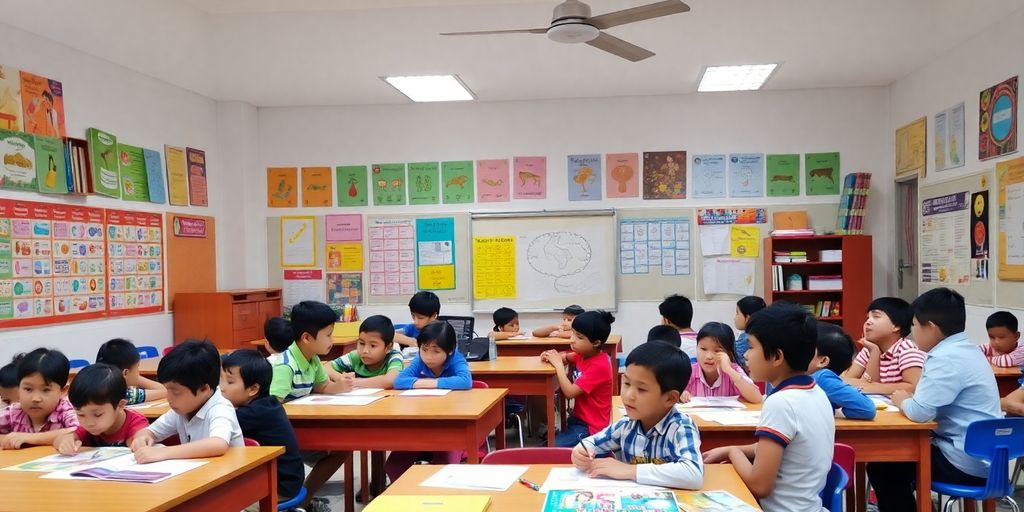Ever wondered how language schools can stand out online? SEO, or Search Engine Optimization, is the secret sauce. It’s all about making your website pop up when folks search for language courses. But it’s not just about any SEO; language schools face unique challenges. You’ve got to think about different languages, local search terms, and cultural quirks. This guide will walk you through the basics and give you a leg up in the crowded world of online language education.
Key Takeaways
- SEO is crucial for language schools to increase their online visibility and attract students.
- Understanding both on-page and off-page SEO can significantly boost your website’s rankings.
- Language schools face unique challenges like catering to multilingual audiences and regional differences.
- Effective keyword research is vital, especially when targeting multiple languages.
- Social media and visual content can complement your SEO efforts by engaging potential students.
Understanding SEO Fundamentals for Language Schools
Defining Search Engine Optimization
Search Engine Optimization, or SEO, is all about making sure your website gets noticed by search engines like Google. When someone types in a search query, you want your language school to pop up as one of the top results. SEO is the practice of tweaking your site so it appears higher in search results, which can lead to more traffic and potentially more students. Think of it as a way to make your website more appealing not just to people, but to search engines too.
Importance of Visibility in SERPs
Being visible in Search Engine Results Pages (SERPs) is like having a prime spot on a busy street. The higher your language school appears in search results, the more likely potential students will find you. This visibility is crucial because, let’s face it, most folks don’t scroll past the first page of search results. A well-optimized site can help ensure that your school isn’t buried beneath your competitors.
On-Page vs Off-Page SEO
On-page SEO is all about what you can control on your website. This includes optimizing your content, using the right keywords, and making sure your site is user-friendly. It’s like tidying up your house before guests arrive. Off-page SEO, on the other hand, involves activities outside of your website, like earning backlinks. Backlinks are like votes of confidence from other sites, showing search engines that your content is worth checking out. Balancing both on-page and off-page strategies is key to a successful SEO plan for your language school.
Unique SEO Challenges for Language Schools
Catering to a Multilingual Audience
Language schools have a unique challenge: they need to speak to a multilingual audience. Prospective students often search for programs in their native languages, which means your website might need to be available in several languages. Search engines don’t automatically rank pages in different languages unless they’re set up correctly. If the structure isn’t right, you could miss out on a lot of potential traffic.
Competing in a Crowded Market
The online language learning market is super competitive. Besides other language schools, you’re also up against online platforms, apps, and free resources. This makes it tough to rank high on search engines, especially for popular keywords like "learn English" or "Spanish courses." To stand out, you need to focus on niche keywords and offer something unique that others don’t.
Addressing Regional Variations
Optimizing for global SEO is another hurdle. Many language schools target international students, which means dealing with localized search terms and region-specific content. Cultural nuances can affect how people in different countries search for educational opportunities. Without the right SEO strategies, your website might only reach a fraction of the audience it could.
Effective Keyword Research Techniques

Identifying Target Languages
When it comes to effective SEO for schools, pinpointing the right languages to target is a game-changer. Start by considering the languages most relevant to your audience. Are you a language school in a multicultural city, or do you offer specialized courses in less common languages? Knowing your audience’s needs helps you focus your efforts.
Create a list of languages that align with your school’s offerings. You might find that some languages attract more interest, depending on cultural or economic trends. Keep an eye on these shifts to adjust your strategy.
Utilizing Keyword Research Tools
Keyword tools are like your treasure map in the world of SEO. They help you discover what potential students are searching for. Tools like Moz Keyword Explorer and Google’s Keyword Planner are popular choices. They can show you which keywords have high search volumes and which ones are less competitive.
- Moz Keyword Explorer: Great for overall SEO insights.
- Google Keyword Planner: Ideal for paid keyword research.
- SEMrush: Offers deeper insights for those who want to get really detailed.
Using these tools, you can find new keyword ideas and see which terms your competitors are targeting. This information is crucial for crafting a strategy that stands out.
Incorporating Long-Tail Keywords
Long-tail keywords might not bring in huge traffic numbers, but they attract visitors who are more likely to enroll. These keywords are specific phrases that potential students use when they know exactly what they’re looking for. For instance, instead of "learn Spanish," you might use "Spanish classes for beginners in New York."
Here’s why long-tail keywords are worth your attention:
- Higher Conversion Rates: Visitors searching with specific terms are often closer to making a decision.
- Less Competition: Fewer sites target these specific phrases, making it easier to rank.
- Targeted Traffic: You attract visitors who are genuinely interested in what you offer.
Focusing on the right keywords means understanding your audience’s language and needs. It’s not just about getting more visitors; it’s about reaching the ones who are ready to learn.
Implementing Multilingual SEO Strategies
Creating Language-Specific Content
Creating content in multiple languages is more than just translating words. It’s about crafting messages that resonate with diverse audiences. You need to understand the cultural context to ensure your content is relevant and engaging. Working with native speakers or professional translators can make a big difference in capturing the nuances of a language. If possible, have someone local review your content to catch any potential errors or awkward phrasing.
Optimizing for Localized Search Terms
When optimizing for search engines, it’s crucial to use keywords that locals actually use. This means doing keyword research for each language and region you target. Localized keywords can vary significantly even within the same language. For instance, a term in Spanish might differ in usage between Spain and Mexico. Use tools like Google Keyword Planner to find these terms and incorporate them into your strategy for effective SEO strategies.
Understanding Cultural Nuances
Understanding cultural differences is key to successful multilingual SEO. Different cultures may have unique preferences, values, and behaviors that affect how they search online. For instance, some cultures might prefer more formal language, while others are comfortable with casual tones. Tailoring your content to these nuances can improve user engagement and increase your site’s effectiveness in reaching diverse audiences.
Multilingual SEO isn’t just about language; it’s about connecting with people on a deeper level by respecting and acknowledging their cultural identities. This approach can help language schools reach a broader audience and create meaningful connections with prospective students.
Leveraging Social Media for SEO Success
Engaging with Prospective Students
Social media is a goldmine for connecting with potential students. It’s not just about posting content; it’s about sparking conversations. Engage directly with your audience by responding to comments and messages. Host Q&A sessions or live videos to answer questions about your language programs. This interaction not only builds trust but also boosts your visibility on search engines.
Sharing High-Quality Content
Content is king, but quality is the crown. Share posts that are informative, relatable, and visually appealing. Use a mix of formats like text, images, and videos to keep it fresh. Don’t shy away from user-generated content; it adds authenticity. When your content gets shared, it increases your reach and signals search engines that your language school is a credible source.
Promoting Events and Classes
Got an upcoming open house or a new class starting? Use social media to spread the word. Create event pages and share regular updates to keep the excitement alive. Encourage attendees to share their experiences online. This not only creates buzz but also generates backlinks to your site, which is great for SEO.
Social media isn’t just a tool for engagement; it’s a bridge to connect your language school with a broader audience, enhancing your online presence organically.
Utilizing Visual Content to Enhance SEO

Importance of High-Quality Images
Images can make or break a website’s appeal. For a language school, using crisp, high-quality images can draw potential students in and keep them engaged. Search engines prefer sites with varied content, and images are a key part of that. Make sure each image has descriptive alt text. This not only aids in accessibility but also helps your site appear in image search results. Remember, an image without a proper description is like a page without a title.
Creating Engaging Videos
Videos are a fantastic way to showcase what your school offers. Think about creating short clips that highlight your teaching methods, campus life, or student testimonials. These videos can help prospective students get a feel for your school before they ever set foot on campus. Plus, videos tend to keep visitors on your page longer, which can boost your local SEO ranking.
Showcasing Student Experiences
Sharing stories from current or former students is a great way to build trust and authenticity. Consider creating a series of videos or blog posts that highlight student journeys or achievements. This not only provides social proof but also enriches your content library, giving you more opportunities to rank in search results.
Engaging visual content can transform a visitor’s experience on your website, turning casual browsers into interested applicants.
Building a Strong Backlink Profile
Importance of Backlinks for SEO
Backlinks are like votes of confidence from other sites, telling search engines your content is worth checking out. For language schools, these links can boost your visibility, making it easier for potential students to find you. High-quality backlinks are crucial because they help your site rank higher in search engine results pages (SERPs).
Strategies for Earning Quality Backlinks
- Guest Blogging: Reach out to language learning blogs or education sites and offer to write guest posts. This not only earns you a backlink but also positions your school as an authority in language education.
- Collaborate with Influencers: Partner with influencers in the education sector who can share your content with their audience, providing you with valuable backlinks.
- Create Shareable Content: Develop content that others in your industry will want to link to. This could be research studies, infographics, or engaging videos showcasing student experiences.
- Utilize Educational Directories: Ensure your school is listed in relevant educational directories and review sites. These platforms offer not only backlinks but also improve your school’s online reputation.
Monitoring Your Backlink Profile
Keeping tabs on your backlinks is essential. Use tools like a backlink monitor to track the status of your links, ensuring they stay active and relevant. This tool alerts you to any lost or broken backlinks, allowing you to take action quickly. For language schools, maintaining a robust backlink profile is key to sustaining online reputation and search engine rankings over time.
"A healthy backlink profile is like a strong foundation for your online presence, supporting your visibility and reputation in the digital world."
Building a strong backlink profile isn’t just about quantity; it’s about quality. Focus on earning links from reputable sources, and keep an eye on your existing backlinks to maintain a solid online presence.
Conclusion
So, there you have it. SEO for language schools isn’t just a nice-to-have; it’s a must-have if you want to stand out in the crowded online world. Sure, it’s a bit of a puzzle with all the keywords, multilingual content, and backlinks, but once you get the hang of it, the payoff is worth it. You’ll see more students finding your school and enrolling in your programs. Just remember, SEO is a marathon, not a sprint. Keep tweaking and improving your strategy, and you’ll stay ahead of the game. Good luck, and happy optimizing!
Frequently Asked Questions
What does SEO mean for language schools?
SEO, or Search Engine Optimization, is a way to make your language school’s website more visible on search engines like Google. By optimizing your site, you can help it show up higher in search results when people look for language learning options.
Why is visibility in search results important?
Being visible in search results means more people can find your school when they search online. This can lead to more students enrolling in your courses.
What are on-page and off-page SEO?
On-page SEO is about improving parts of your website, like titles and content, to make them clear for search engines. Off-page SEO involves things outside your site, like getting other sites to link to yours.
How can language schools use keywords effectively?
Language schools can use keyword research tools to find popular terms people use when searching for language classes. Using these keywords in your website’s content can help attract more visitors.
What is multilingual SEO and why is it important?
Multilingual SEO is about optimizing your site for different languages. It’s important for schools that want to reach students from various countries by providing content in their native languages.
How can social media help with SEO?
Social media can drive more people to your website by sharing interesting content and engaging with potential students. This increased traffic can improve your site’s search engine ranking.






